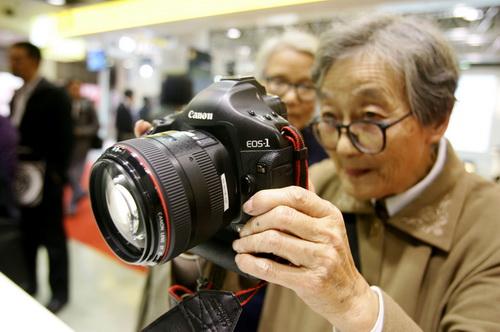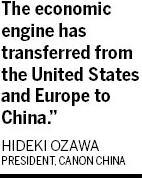Canon president Hideki Ozawa focuses on hitting China sales of $10 billion ahead of 2017 target
BEIJING - Hideki Ozawa is not the traditional Japanese businessman often regarded as aloof, shy and reticent in front of the public. Rather, the 60-year-old executive is a charismatic entrepreneur who enjoys playing acoustic guitar at most of the company's annual dinners.
During his 37 years working for Canon Inc, the world's biggest digital camera maker, Ozawa spend 33 of them working in countries outside his homeland, turning him into one of the most "westernized" executives in the prestigious Japanese firm.

Two elderly customers examine a premium single lens re ex Canon camera at a store in Beijing. Canon said it planned to increase its revenue from Asian countries, including Japan and China, to more than half its global income in the near future, from 41 percent last year. [XU ZHUOHENG / CHINA FOTO PRESS ]
That style, however, did not prevent Ozawa from playing a vital role in the recovery of Canon, which suffered severely from the global financial crisis.
As the president of Canon's business in China, Ozawa's mission is to turn China into Canon's next revenue generator at a time when demand from Japan, the United States and Europe has been sluggish because of the economic slowdown.
Canon said it planned to increase to more than 50 percent its revenue from Asian countries, including Japan and China, in the near future, from 41 percent last year.
"The economic engine has transferred from the United States and Europe to China," said Ozawa.
He said the firm hoped China alone would contribute 10 percent to Canon group sales over the next two years and aimed for top-line growth of 30 percent each year in the near term.
Canon is the world's biggest maker of digital cameras and also one of the largest manufacturers of printers. That two-product line contributed about 40 and 50 percent of its total revenue last year, according to the company.
Over the past few years, the company has recorded about 30 percent growth in China, making the country Canon's third largest market after the United States and Japan.
However, Canon's presence in China is heavily skewed towards digital cameras, which Ozawa said has largely limited future growth for the company among the world's biggest population.
Ozawa said the company planned to actively promote all of the company's portfolios, from office products to medical equipment, in the country. That is expected to boost sales revenue of Canon China from 11 billion yuan last year to $10 billion by 2017, Canon said.
Salesman to boss
Ozawa is typical of many Japanese people who serve just one company throughout their working lives. He joined Canon after he graduated from college in 1973 and worked first as a sales person. But he said his typically Japanese personality did not change much until 1978 when he was sent to Canon's subsidiary in the United States.

"When I first came to America, I was very overcautious and shy to speak to my clients, partly because of my poor English," remembered Ozawa. "So my American colleagues told me to take things more easily."
During the following 12 years, Ozawa gradually learned English well and grew in confidence in dealing with clients and colleagues. He even started liking American country music.
Thanks to his excellent performance in the US, Ozawa was called back to Canon Japan and became the general manager of the company's imaging group in 1990. Four years later, he was appointed general manager of Canon's image group in Singapore.
China story
Ozawa's relationship with China came first in 1999 when he was appointed to the vice-presidency of Canon Hong Kong. He said in an interview with the Chinese media that he didn't form a good first impression with people in the region. But he soon found merit among local consumers.
"They are hard to get close to at first, but once you start to establish a good friendship with them, you will find them very kind and considerate," he said.
After a few years getting familiar with the region, Ozawa's talent in marketing gradually revealed itself.
In 2003, Severe Acute Respiratory Syndrome (SARS) struck the mainland and Hong Kong and business activity declined dramatically as people's fears of the infectious disease reached a climax.
In order to boost consumer confidence, Ozawa launched a charity campaign that donated HK$1.5 million to the Hong Kong Hospital Authority to support frontline medical staff. He also launched a marketing campaign called "Hong Kong Ka Yau" (Go ahead, Hong Kong), in public locations such as the airport, bus stations and subways to revitalize confidence and to attract visitors from around the world.
These activities helped to boost the brand image of Canon in Hong Kong. As a result, sales revenues of Canon in Hong Kong increased dramatically by 54 percent in 2003, year-on-year.
Head of Canon China
Hideki Ozawa, president of Canon s business in China, said sales were a kind of art for which a good performer needs great passion.
Ozawa's achievement in Hong Kong paved his way for him to play a bigger role in Canon. In 2005, he was appointed to be president of Canon China.
In 2004, sales revenues of Canon in China amounted to just 450 million yuan, accounting for less than 2 percent of the company's total revenues. When Ozawa took the job, his first year goal was to increase sales revenues by one third.
That year, China started to allow foreign products manufactured in China to be sold in the domestic market, as part of its obligations for being allowed to enter the World Trade Organization. That enabled many foreign firms such as Canon to sell their China-made products through distributors instead of expansive agents that often reacted slowly to market demands.
Over the next few years, Canon quickly expanded its sales team across China and established after-sales offices. That boosted Canon China's revenue by 38 percent in 2005.
Sales an 'art'However, Ozawa said rather than the restructuring of its sales channel, the major change in Canon China was the employees' passion to serve customers.
Curriculum vitae of Hidek Ozawa
Hideki Ozawa is in charge of Canon's operations on the Chinese mainland and the company's marketing in Asian countries outside Japan and South Korea. He used to be the president and chief executive officer of Canon Hong Kong and Canon Singapore. He has been the president and CEO of Canon China and Canon Asia Marketing Group since 2005. Hideki Ozawa entered Canon Sales Co Inc in 1973 after graduating from the department of Law at Keio University. He was born in Japan in 1950.
Positions:
1973: Entered Canon Sales Co Inc (renamed Canon Marketing Japan Inc)
1999: Vice-president of Canon Hong Kong Co Ltd
2000: Vice-president of Canon Hong Kong Co Ltd, president and CEO of Canon Marketing (Hong Kong) Co Ltd
2003: President and CEO of Canon Hong Kong Co Ltd
2004: President and CEO of Canon Singapore Pte Ltd
Since 2005: President and CEO of Canon (China) Co Ltd and Canon Asia Marketing Group
Since 2007: Director of the board of Canon Inc
"When I worked in Singapore, Hong Kong and Beijing, I discovered that our employees were very shy, and some didn't even show any response when I said hello to them," he said during an industrial forum in 2007.In order to change the company culture, Ozawa ordered all Canon China employees to wear red on Mondays (red ties for the men and red suits for the women). He also launched a campaign that encouraged employees to say hello to their colleagues every day."I think sales is a kind of art, in which a good performer needs great passion," Ozawa said. These measures helped China to become the company's fastest growing region in 2006 and 2007.
Financial crisis
Despite maintaining rapid growth, the financial crisis has greatly impacted on Canon's business across the world. In 2008, Canon's net profit declined by 37 percent. In some factories, business orders plunged by as much as 50 percent, according to Makoto Murano, head of a Canon's factory in Oita, Japan.
Shrinking profit margins, a stronger yen and plunging demand in mature markets have certainly not helped the world's largest camera maker.
"Among all the countries, China played a vital role in our recovery from the global crisis as its economy still maintained undisturbed growth," said Tsuneji Uchidapresident of Canon. He added the company planned to move more factories to China to reduce costs and would aggressively expand in the country over the next few years. "We want to be number one in all market sectors in which we have products," he said.
Since 2008, Canon has indeed aggressively expanded its printer business in China and aims for a 150 to 200 percent growth in shipments in China this year and next year. If it achieves this, it is expected to make Canon the biggest printer vendor in China this year, surpassing Hewlett-Packard.
Last year, it also started to promote heavily its medical equipment, mainly a digital radiography system, in major Chinese hospitals, in an effort to ride the boom of the Chinese government's healthcare reforms, which are expected to trigger an 850 billion yuan investment.
Ozawa said Canon's strategy to boost the China market worked quite well in the first quarter of this year, in which the company's sales value rose 35 percent - more than twice that of the company's average growth in the global market.
He said of Canon China's goal to boost sales to $10 billion in 2017: "We hope to achieve that target earlier because of the strong economic recovery in China."





